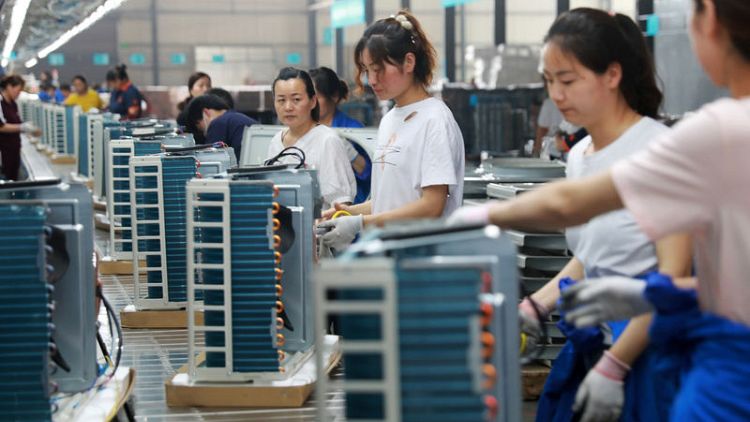BEIJING (Reuters) - China's factory activity shrank for the third month in a row in July, an official survey showed, underlining the growing strains on the world's second-biggest economy as the Sino-U.S. trade war hits business profits, confidence and investment.
Wednesday's weak manufacturing reading could fuel worries of a global recession and explains why policymakers around the world have stepped up easing measures, with some others considering doing so soon, to counter the fallout from international trade frictions.
The Purchasing Managers' Index (PMI) rose to 49.7 in July, China's National Bureau of Statistics said on Wednesday, higher from the previous month of 49.4 but remains below the 50-point mark that separates growth from contraction on a monthly basis. Analysts polled by Reuters predicted a reading of 49.6.
Deteriorating global demand left exporters struggling, with the survey showing export orders shrinking for the 14th month, though the sub-index ticked up fractionally to 46.9 from June's 46.3. The contraction in total new orders also moderated slightly.
China's factory output offered one brighter note, with growth quickening this month as the subindex rose to 52.1 from 51.3 in June.
The official gauge came on the second day of U.S. and Chinese trade negotiators' meeting in Shanghai, their first in-person talks since a G20 truce last month.
Expectations for progress during the two-day meeting are low, so officials and businesses are hoping Washington and Beijing can at least detail commitments for "goodwill" gestures and clear the path for future negotiations.
In a row that has dragged on for more than a year, the world's two largest economies have slapped billions of dollars of tariffs on each other's imports, disrupting global supply chains and shaking financial markets. That has prompted central banks from India to Australia to South Africa to cut rates, with the U.S. Federal Reserve also widely expected to ease later on Wednesday for the first time since the global financial crisis.
The survey also showed persistent decline in orders from domestic customers, and even though demand conditions improved slightly it still remained worryingly weak despite a raft of recent stimulus measures.
Sluggish demand at home and abroad has led to a months-long spell of depressed activity for China's manufacturers, and a sharp U.S. tariff hike announced in May threatens to crush already-thin profit margins.
Some manufactures have cut this year's sales target as clients delay purchase orders in a wait-and-see approach, while others have already relocated their production capacity to neighbouring countries to avoid the tariff hit.
The pressure on the manufacturing sector and weakening profits have prompted analysts' warnings of a further period of stress for China before growth is expected to stabilise or recover.
So far, Beijing has relied on a combination of fiscal stimulus and monetary easing to weather the economic slowdown, including hundreds of billions of dollars in infrastructure spending and tax cuts for companies.
But the economy has been slow to respond, and business confidence remains shaky, weighing on investment.
Factories continued to cut jobs in July. The employment sub-index edged up to 47.1, compared with 46.9 in June.
China observers have said that Beijing's recent growth-boosting measures will take time to filter through to the broader economy, and many analysts are of the view that further stimulus is needed to prevent a deeper downturn and to help stabilise growth.
A separate official business survey showed activity in China's services sector grew at its slowest pace in 8 months in July, knocked by growing pressure on the broader economy from U.S. trade measures, with the official reading at 53.7 in July from 54.2 in June.
Beijing has been counting on a strong services sector to pick up the slack left by faltering trade as it tries to shift the economy away from a dependence on heavy industry and manufacturing exports.
(Reporting by Lusha Zhang and Ryan Woo; Editing by Shri Navaratnam)



